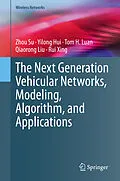This book proposes the novel network envisions and framework design principles, in order to systematically expound the next generation vehicular networks, including the modelling, algorithms and practical applications. It focuses on the key enabling technologies to design the next generation vehicular networks with various vehicular services to realize the safe, convenient and comfortable driving. The next generation vehicular networks has emerged to provide services with a high quality of experience (QoE) to vehicles, where both better network maintainability and sustainability can be obtained than before.
The framework design principles and related network architecture are also covered in this book. Then, the series of research topics are discussed including the reputation based content centric delivery, the contract based mobile edge caching, the Stackelberg game model based computation offloading, the auction game based secure computation offloading, the bargaingame based security protection and the deep learning based autonomous driving. Finally, the investigation, development and future works are also introduced for designing the next generation vehicular networks.
The primary audience for this book are researchers, who work in computer science and electronic engineering. Professionals working in the field of mobile networks and communications, as well as engineers and technical staff who work on the development or the standard of computer networks will also find this book useful as a reference.
Autorentext
Prof. Zhou Su works on the topics include Internet of things, wireless communication and network security. He has published more than 100 international journal and conference papers including IEEE/ACM ToN, IEEE JSACIEEE TMCIEEE TMMIEEE TWCIEEE TVTIEEE TBDIEEE TETC, etc. He received the best paper award of IEEE ICC2020, IEEE BigdataSE2019, IEEE Comsoc TCCGC 2018, IEEE CyberSciTech 2017,etc. He is an associate editor of IEEE Internet of Things Journal and IEEE Open Journal of Computer Society.
Yilong Hui works on the topics include wireless communication, mobile edge computing, vehicular networks, autonomous driving and intelligent transportation system. He is a lecturer with the State Key Laboratory of Integrated Services Networks, and with the School of Telecommunication Engineering, Xidian University, China. Dr. Hui has published over 20 scientific articles in leading journals and international conferences, including IEEE JSAC, IEEE/ACM TON, IEEE TITS, IEEE TVT, IEEE TETC and IEEE Wireless Communications.
Tom H. Luan is a professor with the School of Engineering, Xidian University, Xi'an, China. He received the B.E. degree from the Xi'an Jiaotong University, China, in 2004, the Master degree from the Hong Kong University of Science and Technology, Hong Kong, in 2007, and the Ph.D. degree from the University of Waterloo, Canada, in 2012, all in Electrical and Computer Engineering. Dr. Luan has authored/coauthored around 40 journal papers and 30 technical papers in conference proceedings, and awarded one US patent. He served as a TPC member for IEEE Globecom, ICC, PIMRC and the technical reviewer for multiple IEEE Transactions including TMC, TPDS, TVT, TWC and ITS.
Qiaorong Liu works on the topics include computation offloading and caching in vehicular networks. She received the B.E. degree from the Northwest University for Nationalities, China, in 2016, and the master degree from Shanghai University, China, in 2019.
Rui Xing works on the topics include security and optimization in vehicular networks. He received the B.E. and master degree from Shanghai University, China, in 2017 and 2020, respectively.
Zusammenfassung
This book proposes the novel network envisions and framework design principles, in order to systematically expound the next generation vehicular networks, including the modelling, algorithms and practical applications. It focuses on the key enabling technologies to design the next generation vehicular networks with various vehicular services to realize the safe, convenient and comfortable driving. The next generation vehicular networks has emerged to provide services with a high quality of experience (QoE) to vehicles, where both better network maintainability and sustainability can be obtained than before.
The framework design principles and related network architecture are also covered in this book. Then, the series of research topics are discussed including the reputation based content centric delivery, the contract based mobile edge caching, the Stackelberg game model based computation offloading, the auction game based secure computation offloading, the bargain game based security protection and the deep learning based autonomous driving. Finally, the investigation, development and future works are also introduced for designing the next generation vehicular networks.
The primary audience for this book are researchers, who work in computer science and electronic engineering. Professionals working in the field of mobile networks and communications, as well as engineers and technical staff who work on the development or the standard of computer networks will also find this book useful as a reference.
Inhalt
1 Introduction
1 1.Overview of Vehicular Networks
1 1.1 Architecture of Vehicular Networks
1 1.2 Applications in Vehicular Networks
1.2 Overview of Enabling Technologies
1.2.1 Advanced Communication-5G
1.2.2 Mobile Edge Computing
1.2.3 Network Function Virtualization
1.2.4 Software Dened Network
1.2.5 Computation Ofoading
1.2.6 Blockchain
1.2.7 Information Centric Networks
1.2.8 Edge Caching
1.2.9 Autonomous Driving
1.2.10 Articial Intelligence
1.3 Aim of the Book
2 ReputationBasedContentDeliveryinInformationCentricVehicularNetworks
2.1 Introduction
2.2 Overview of Information Centric Vehicular Networks
2.2.1 Content Delivery in Vehicular Networks
2.2.2 ICN Based Content Delivery
2.2.3 Challenges of Content Delivery in Information Centric Vehicular Networks
2.3 Reputation Based Vehicular Networks
2.4 Framework of Reputation Based Content Delivery in Information Centric Vehicular
2.4.1 Network Architecture
2.4.2 FrameworkofReputationBasedContentDeliveryinInformationCentricVehicular Networks
2.5 Simulation
2.5.1 Setting
2.5.2 Results Analysis
2.6 Summary
References
3 Contract Based Edge Cachingi n Vehicular Networks
3.1 Introduction
3.2 Edge Caching in Vehicular Social Networks
3.2.1 Vehicular Social Networks
3.2.2 Edge Caching in Vehicular Networks
3.2.3 Challenges of Edge Caching in Vehicular Networks
3.3 Contract Based Edge Caching in Vehicular Networks
3.4 Framework of Contrac…
Titel
The Next Generation Vehicular Networks, Modeling, Algorithm and Applications
EAN
9783030568276
Format
E-Book (pdf)
Hersteller
Veröffentlichung
12.11.2020
Digitaler Kopierschutz
Wasserzeichen
Dateigrösse
5.92 MB
Anzahl Seiten
157
Unerwartete Verzögerung
Ups, ein Fehler ist aufgetreten. Bitte versuchen Sie es später noch einmal.
